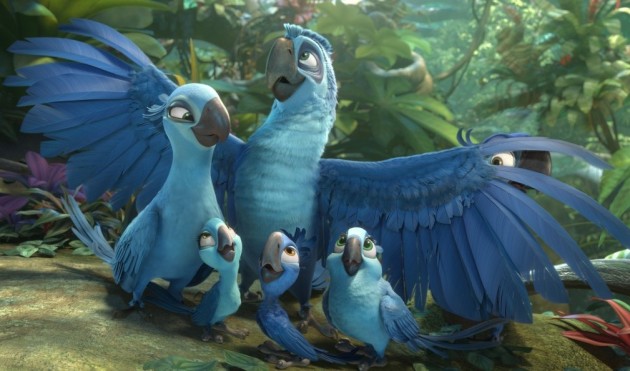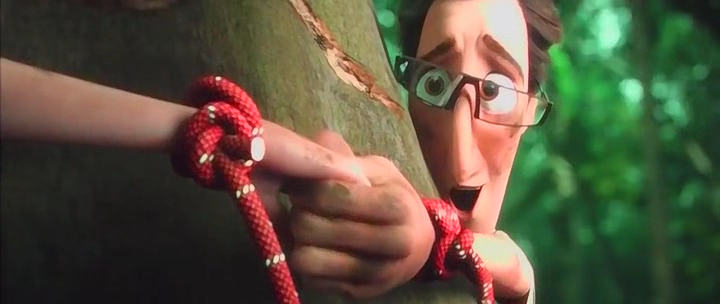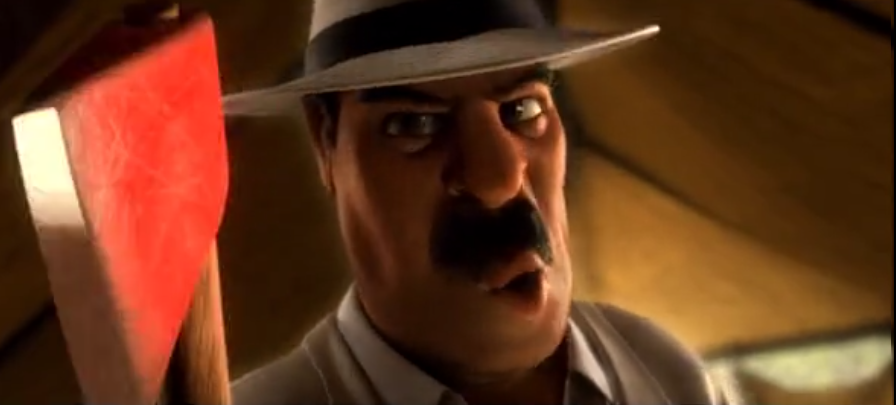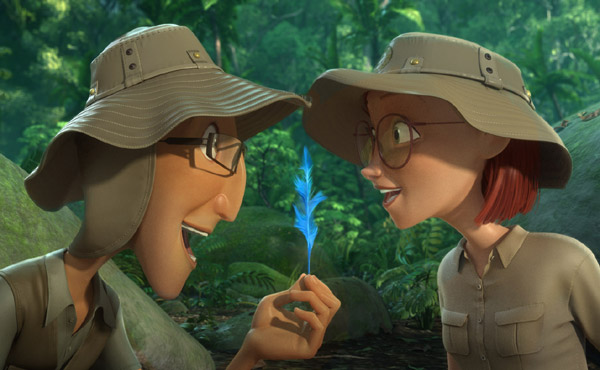I've pre-written and scheduled posts for my babymoon as we enjoy the anticipation of our new little one. Responses may be sporadic during this time!

I recently took the boys to see Rio 2 at the $3 theater, a movie about domesticated blue macaws who find a new home back in the rainforest. It was an enjoyable movie (and I wasn't too lost from not having seen the first one…), but as the film progressed, I was struck by the feeling: I've seen this before.
Without spilling much of the plot, suffice it to say that there's an oppositional setup between the noble conservationists and the greedy developers who want to clear cut the Amazon rainforest. It's the classic good vs. evil in children's-movie form.
 |  |
| Who's your hero: the literal tree hugger… | …or the big, scary guy with an axe? |
We've seen variations of it in movies that play on the dichotomy of beautiful, free wild animals vs. the mean bullies who try to enslave them (Finding Nemo, Free Willy, Chicken Run, Madagascar), or just the general message that poorer or less business-minded people are nobler than the rich and must teach the wealthy to be fully human (Annie, Elf, A Christmas Carol).
But Mikko and Alrik and I watched Rio 2 in the comfort of stadium seating and air conditioning, munching on popcorn with "butter" along with some "fruit" snacks (apostrophes entirely necessary, I assure you), and then we drove home in our gasoline-fueled car along a convenient highway. While we were at the theater, Sam, the children's father and my husband, worked hard on our family business of reselling DVDs online, to make money and support the family, the better to fund our second-run-theater excursions.
So whose side are we really on?
Do children need to have an unrealistic message drummed into them again and again? Did my kids run out of the theater begging to visit the Amazon and save all the sentient, singing rainforest creatures? No, they did not. In fact, Mikko thought it was downright hilarious that someone named a river after an online store. And Alrik refuses to go anywhere that might have bugs!
Besides, no matter how many children's tales we encounter seeking to disprove the fact, animals do not talk and sing and act like humans. Do we really think our cats are fomenting rebellion at being made into pets? (Or do they just dig the free salmon?) Do we really believe our toys are weeping buckets whenever we don't play with them enough? (Thanks a lot for the extra heaping of guilt over inanimate objects, Toy Story franchise. Way to encourage my kids to be hoarders.)
I just had this uncomfortable sense while watching Rio 2 that, even though my heart was being swayed by the impassioned, hapless hippie scientists and the plucky, can-do macaws, I'm really more like the developers. I live in a city; I live inside a building; I like paved roads and abundant stores and consistent internet access.

Don't get me wrong — I deplore the destruction of the rainforest and the fact that untold numbers of species are disappearing along with the trees. And I do think these movies are a good way to start a conversation about conservation (say that ten times fast). But the either/or, black/white, good/evil way of thinking befuddles and even irritates me. Are we "bad guys" for owning our own business? Are we villains for visiting zoos and owning pets and eating meat? Obviously, some would say yes, but if we as a family don't believe so, then why do all the movies available to us still give our kids that message?
On the flipside, are all our efforts to be eco-conscious just so many failures? Is it worth it to turn off our faucets, turn down our thermostats, buy organic and free-range, use family cloth and cloth diapers, and so on? Or are we truly committed only if we drop everything to live in the jungle with animals as our pals?
We live in a part of the city of Seattle that's under rapid development. Well, probably the whole city always is, but I mostly hear about our neighborhood through the local blog. Every time an older building's being pulled down to make way for a new block of town homes, the comments section is filled with people decrying the soullessness of development. And I get it — I do. I get tired of seeing the same new boxy architecture everywhere, too. I mourn the loss of the quaint little bungalows.
But then I was thinking: I bet when those cute bungalows went up, there was some version of a comments section of people bemoaning the loss of whatever the bungalows were displacing. Even if a mud hut went up in a field, there'd be people sad to lose that part of the field. But so it goes. Progress is what it is, and there's no stopping it (so far — see WALL·E).
On the other side of the coin, perhaps highlighting conservationists, animals, children, the disadvantaged, etc., is a way of giving a voice to those who culturally have less of one. It could be seen as a useful way to open children's eyes and hearts to the most vulnerable. Or, back to the first side of the coin, as a meaningless sop, since most will continue to be raised to disregard those without clout.
So, in any case, is it useful? Are these black & white dramatizations of nature vs. cities, poor vs. rich, animal vs. human helpful, or naive, or just plain manipulative?
What do you think? Are the story lines in these films disingenuous? Is the setup of moral vs. immoral over the top or necessary for young minds to process? Is there any need for unlearning the lessons of these movies and teaching our kids a more nuanced appreciation of modernity, or are they just a splash within an oceanic culture of overconsumption and overdevelopment?
Discuss.









 I'm Lauren Wayne, writer and natural parent. I embrace attached parenting with an emphasis toward green living.
I'm Lauren Wayne, writer and natural parent. I embrace attached parenting with an emphasis toward green living. 


0 comments:
Post a Comment